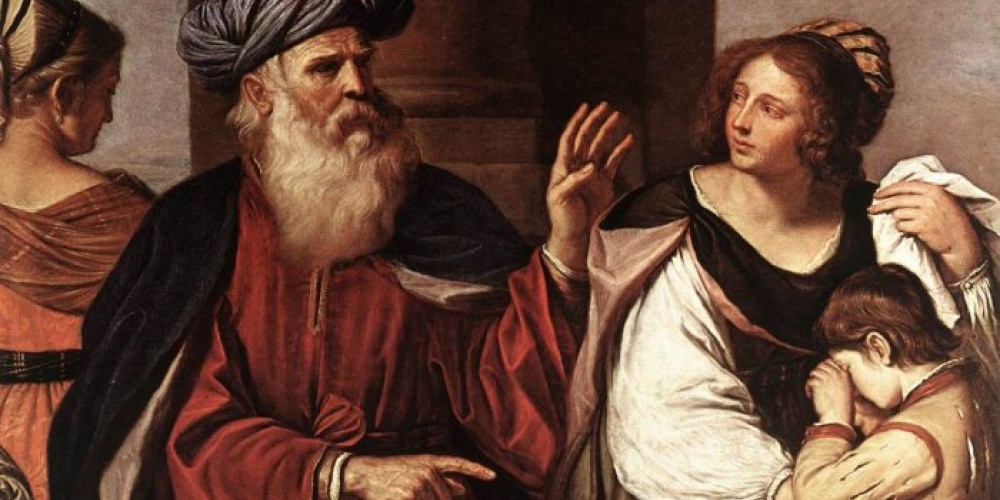"And Abraham took another wife and her name was Keturah" (Breisheet 25:1). The Torah follows by listing the six children they had together, along with some of their offspring, discusses Abraham's division of his assets--he was, we must recall, a very wealthy man--before his death, his death and burial, concluding with a listing of the children of Yishmael. Yet it is not clear what this adds to the covenantal narrative. If Sefer Breisheet, especially after we meet Abraham, is the story of the choosing and defining of the Jewish people, this narrative seems to add little--detailing as it does the lineage of those who would not be part of the Jewish people.
"Your name shall no longer be Abram and your name will be Abraham, for I have made you the father of a multitude of nations" (Breisheet 17:5). The Torah may be the mission statement of the Jewish people, and Sefer Breisheet may detail who will be and who will not be included in the covenantal people, but the Jewish people do not live in a vacuum. Not insignificant sections of Breisheet--even after Abraham is chosen to be the founder of the Jewish people--detail our relationship with foreign kings and rulers, be they military adventures, peace agreements, or personal interactions. Abraham's mission is a universal one.
Parshat Chayei Sarah ends with a listing of the children of Yishmael. That there are 12 is not coincidental. The 12 tribes of Israel have their parallel in Abraham's oldest son. Even more striking, last week's parsha ends with the listing of Abraham's nephews, born to his brother Nachor. "Here, too" (see Rashi 22:20) there are 12 children; 8 from his wife and 4 more from his concubine, foreshadowing the 12 sons of Yaakov. And this seemingly meaningless genealogy is recorded immediately after the Akeidah, where Abraham tells his servants to stay behind as "the boy and I will go to that place. We will worship and return to you" (22:5). The moment that perhaps most defined the nature of the relationships of the Jewish people and G-d is followed by a listing of names that we will never encounter again[1].
In addition to the Abraham being the father of many nations, it appears that this listing of Abraham's non-Jewish descendants has a personal aspect to it. A 'simple' reading of the text leads to the conclusion that Abraham married three women; Sarah the mother of Yitzchak, Hagar the mother of Yishmael, and Ketura the mother of his six other children. This point can be further demonstrated when, after listing Ketura's descendants, the Torah tells us that "to the sons of the concubines of Abraham he gave gifts". The use of the plural is a clear indication of at least two, a point further indicated by the listing of Yishmael's children in a separate parsha paragraph.
Yet Rashi, quoting our Sages, claims that Ketura was none other than Hagar. What need did our Sages feel to go against the plain meaning of the text? Apparently, this marriage for the second time to Hagar was to reestablish their relationship, an act of teshuva if you will. After marrying Hagar (the first time), Abram (as he was known back then) allowed Sarai (as she was known) to throw Hagar out of the house. She only returns "to be afflicted" on the orders of an angel. She returns, only to be thrown out again--on G-d's instructions--after the birth of Yitzchak. There was fear that she, and especially Yishmael, would be a negative influence on Yitzchak. Yitzchak and Yishmael had to be separated, and over the course of history, the children of Yitzchak would suffer much from the children of Yishmael.
But reconciliation is always possible. Yishmael, our Sages teach, did teshuva; and Abraham and Ketura, both with new names, could marry not as master and concubine, but husband and wife--"and he took a wife, and her name was Ketura".
It was Hagar who named the place of her encounter with the angel be'er lechai roi, "the well where G-d is seen". And after the death of Abraham, Yitzchak "dwells at be'er lechai roi". May the children of Yitzchak and Yishmael soon sit together at the same well. Shabbat Shalom!
[1] While this listing also mentions the birth of Rivka--and Rashi notes it is for her only that this genealogical table was listed--she is listed separately. The fact that the Torah choose to list her birth in conjunction with the 12 sons of Nachor further highlights the interaction of Jew and non-Jew.

